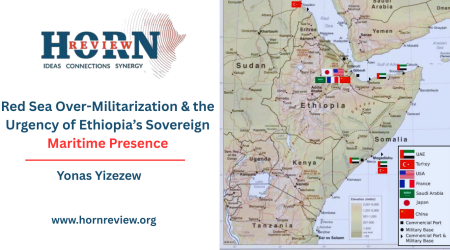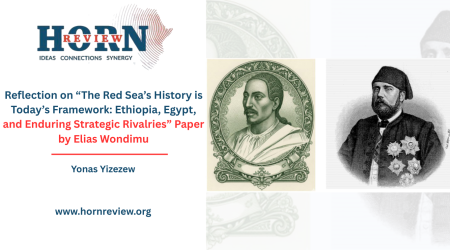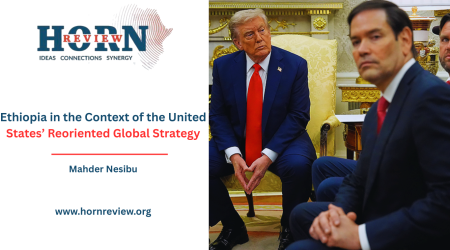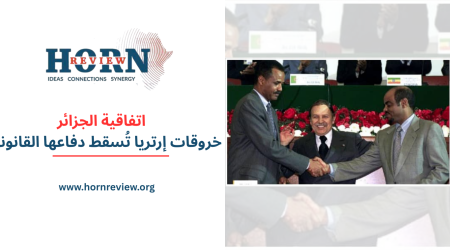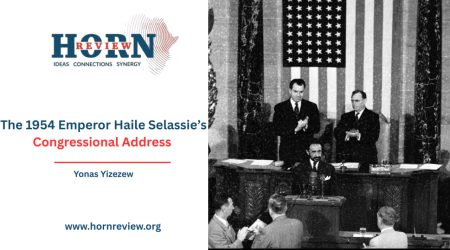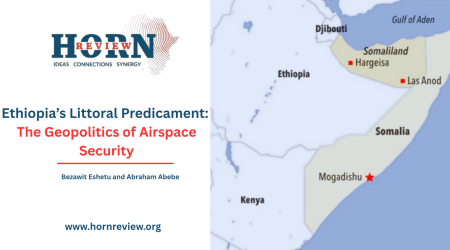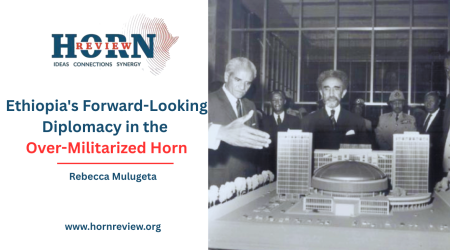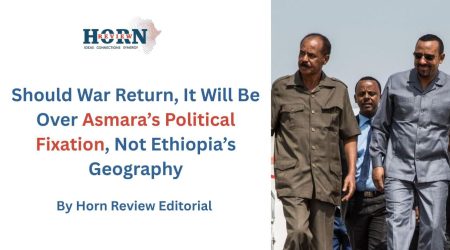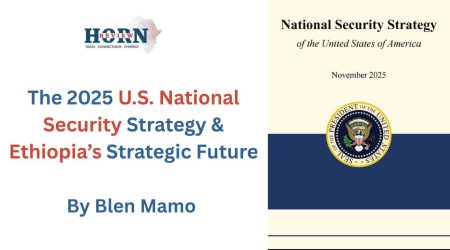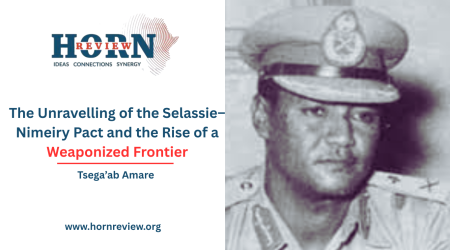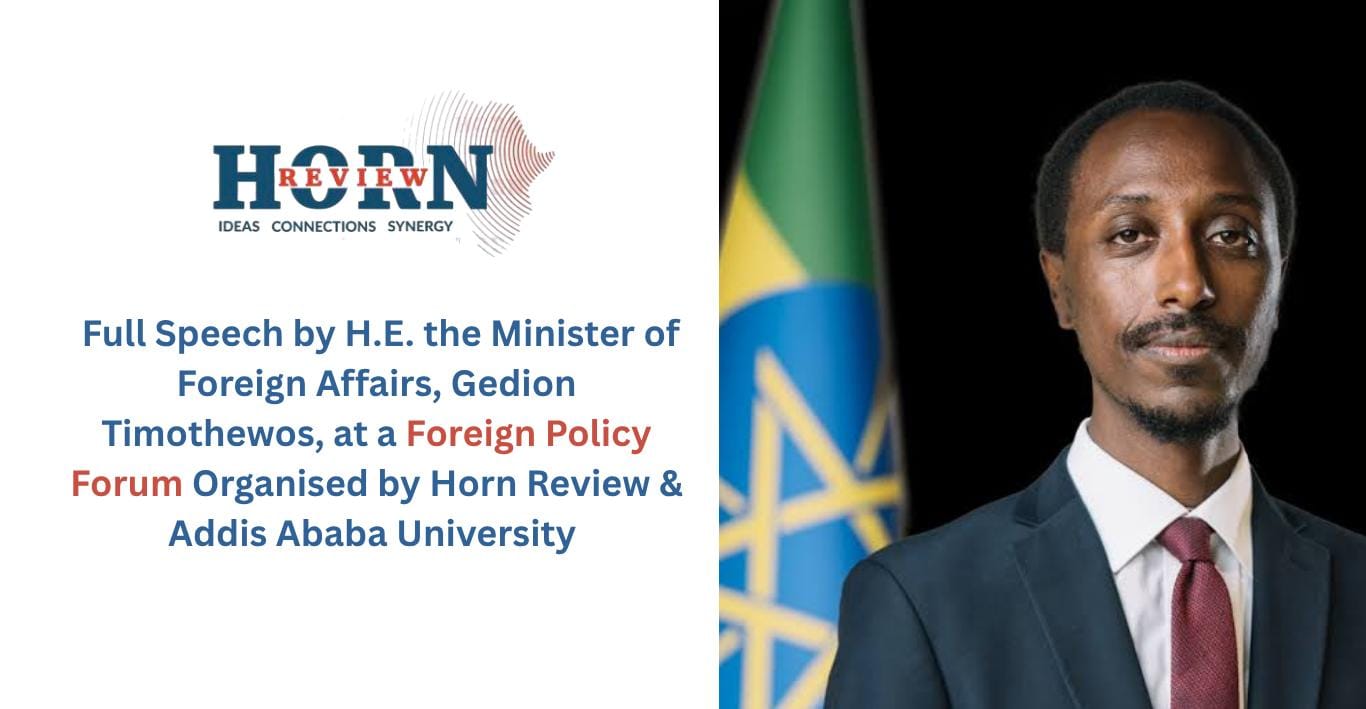
14
Nov
Ethiopia’s Policy and Perspective on the Developments in the Horn of Africa, With a Focus on Ethiopia-Eritrea Relations
Dear President Samuel Kifle,
Members of the Diplomatic Corps,
Distinguished Guests,
Ladies and Gentlemen,
Allow me to begin my address by thanking Addis Ababa University and the Horn Review for organizing this platform and giving me this opportunity to share with you the policy perspectives of the Government of the Federal Democratic Republic of Ethiopia on some developments in the Horn of Africa.
Even a cursory glance at news headlines and social media commentary these days makes it clear that the Horn of Africa is going through a very turbulent period. Turbulence, conflict, and insecurity have, for a long period, been defining characteristics of the Horn. If one surveys the peace and security situation of the Horn of Africa right now, there are considerable challenges virtually in every country.
This is despite the enormous development potential of the region. Both in terms of human and natural resources, the Horn is a region that is generously endowed. It has vast arable land, many water resources, rich mineral deposits, and hardworking people capable of innovation and enterprise.
The cultural and civilizational heritage of the region is also a great asset that provides a foundation for common pursuits and deep cooperation across borders. The very limited time we have this morning would not be enough to do justice to the complexity of all recent developments in the Horn. Therefore, I have opted to focus my attention particularly on the relationship between Ethiopia and Eritrea and situate this within Ethiopia’s broader policy perspective concerning the Horn of Africa. I hope you will find the reasons for my decision to narrow the scope of my remarks to be self-explanatory.
The Ethiopia-Eritrean file seems to be one of the perennial flashpoints in the Horn of Africa. From the mid-20th century till today, it is an issue that has been bedeviling the Horn. In the span of 73 years, there has been a federation, complete unification, and secession involving Ethiopia and Eritrea.
The change in political configurations has not yielded enduring peace and harmony. Within this period, which is three-quarters of a century, there were several rounds of conflicts. From the early 1960s until 1991, there was a civil war of epic proportions that lasted for thirty years. After this conflict ended in 1993, Eritrea became an independent state and co-existed in relative peace with Ethiopia until 1998. However, this peaceful coexistence of Ethiopia and Eritrea, lasted barely for five years. Then a war broke out in 1998.
Adjudicating on who triggered the conflict, the Eritrea-Ethiopia Claims Commissionfound Eritrea to be the aggressor. In its finding on the merits, the Commission asserts that “The evidence showed that, at about 5:30 a.m. on May 12, 1998, Eritrean armed forces, comprised of at least two brigades of regular soldiers, supported by tanks and artillery, attacked the town of Badme”. The Commission characterized this attack as an invasion and concluded that “Eritrea violated Article 2, paragraph 4, of the Charter of the United Nations by resorting to armed force to attack and occupy Badme, then under peaceful administration by Ethiopia.” The interstate conflict between Ethiopia and Eritrea, which was triggered by Eritrea’s aggression, formally came to an end with the conclusion of the Algiers Agreement in December 2000. However, while the Algiers Agreement put an end to the active state of war between the two countries, it did not resolve the conflict. The two states remained locked in a no-peace and no-war hostile limbo for 18 years until 2018.
In 2018, Ethiopia took the courageous step of breaking the deadlock and establishing a period of rapprochement with Eritrea. Ethiopia also took it upon itself to rehabilitate Eritrea’s international standing and bring it back from its state of isolation. Ethiopia also took the lead in advocating for the lifting of the international sanctions against Eritrea. Despite these overtures of goodwill from the Ethiopian side, the rapprochement proved to be short-lived. Although short-lived, this brief experience had once again demonstrated the overwhelming will and aspirations of the peoples of Ethiopia and Eritrea to live in peace and harmony.
This sentiment, unfortunately, was not shared by the Government of Eritrea, which has shown its abhorence to peaceful and normal neighbourly relations. Right now, the tension between the two countries is something that is a matter of public knowledge and a cause for alarm among all who wish to see a peaceful Horn of Africa. So, the question is, what does this historical record tell us? The contemporary tension between the two countries is not an anomalous situation. Conflict and tension seem to have been the rule rather than the exception between Ethiopia and Eritrea. If we look at the period from 1960 until 2025, for most of this period, both before and after Eritrean independence, conflict has been the dominant feature of relations in this part of the Horn.
I believe, recalling this context and historical background is important to avoid a very superficial understanding of current tensions. For instance, some external observers claim that the tension between Ethiopia and Eritrea emanates from Ethiopia’s aspirations for access to the sea. But such claims are difficult to square with the historical record, which shows that the Eritrean government has acted in a hostile manner even against previous Ethiopian governments that had categorically renounced all maritime claims and aspirations.
In 1998, when Eritrea launched an all-out military assault against Ethiopian sovereignty, the government of the day in Addis Ababa had no maritime ambitions. After the end of the war, when the Eritrean government worked relentlessly to destabilize Ethiopia, going to the extent of supporting al-Shabab, the EPRDF the ruling party of Ethiopia at that time, espoused no claim regarding the Red Sea. It is in the public record that the administration of the late Prime Minister Meles Zenawi aggressively pushed back against all local political forces who raised the issue of access to the sea. Perhaps, the most passionate champion and the staunchest advocate of Eritrean independence and sovereignty was at the helm of state power in Addis Ababa. However, this has not stopped the Eritrean government from adopting a totally hostile posture against the Ethiopian government led by Prime Minister Meles. Those who assume that the tension between the two states is caused by Ethiopia’s maritime ambition are making a mistake similar to those who assumed that the war from 1998-2000 was a border war. Very often, in matters concerning these two countries, there is more than what meets the eye.
In their comprehensive analysis of the Ethio-Eritrean war of the late 90s, Tekeste Negash and Kjetil Tronvoll pushed back against simplistic understandings of the causes of that conflict. In their attempt to make sense of the war, they pointed out to a complex web of economic, historical, and cultural factors. They also argued that superficial analysis of the causes of the conflict made efforts to contain the outbreak of the war ineffectual. These days, just like those who erroneously assumed that a border dispute about the town of Badme was the cause of the conflict in the 1990s, some think that the Assab port is the bone of contention and the locus of the tension between the two countries today. Such an assumption would be, to make an understatement, a gross oversimplification, which would hamper a proper understanding of reality. This kind of misdiagnosis could result in wrong and unhelpful prescriptions. It is important to have a proper and in-depth understanding of the problem before we attempt to resolve it.
At the root of the cycle of conflicts and tensions between Ethiopia and Eritrea, especially in its contemporary form, one could point to five major underlying causes. I will briefly try to outline and explain these factors.
- The first factor is the desire of the Eritrean government to have an Eritrea that is sovereign and independent while enjoying the benefits and retaining the privileges to be derived from being part of the Ethiopian body politic. Just like those who like drinking coffee but want to avoid the effects of caffeine by having decaffeinated coffee, the Eritrean government wants to enjoy the status of a sovereign state without the consequences and responsibilities such a status entails.
In political terms, this desire manifests itself in the tendency of senior officials of the Eritrean state, notably the president to provide a running commentary on all things Ethiopian. Both officials and social media personalities affiliated with the Eritrean state feel entitled to take positions, provide opinions and even actively engage in Ethiopia’s domestic political matters. But this goes beyond politics. The Eritrean governing class believes that Eritreans have a stake in the Ethiopian economy. This sense of perverted entitlement, a belief that what is mine is mine and what is yours is ours, is a common thread that underlies our troubled history. Illicit, predatory, and exploitative trade practices were rampant before the 1998 conflict, and echoes of the same tune can also be heard loud and clear even today.
- Another problem is the tendency of the Eritrean leadership to present itself as an instrument for all forces having hostile intentions against Ethiopia. The instrumentalization of Eritrea by those who desire to destabilize Ethiopia and curtail its progress makes peaceful coexistence very difficult.
Clashing interests naturally create frictions between neighboring states. In the Eritrean case, what we have is something different. It is not Eritrea’s national interests or just the predatory tendencies of the regime that are dictating a hostile policy against Ethiopia. It is also the Eritrean leadership’s eagerness to act as a regional proxy for third parties that has made relations between the two countries very difficult. It could even be argued that this is a congenital defect of the Eritrean state. After all, from the very beginning, the Eritrean colony was established not with the intention of having a self-contained colony but an entity deliberately created from the get-go to block Ethiopia’s access to the sea and as a launching pad for a full-scale colonial invasion of Ethiopia. Eritrea was just the opening act in what was meant to be a full-fledged conquest of Ethiopia.
Later on, other regional actors whowanted to weaken Ethiopia used the Eritrean liberation movements as an effective instrument to make Ethiopia bleed. Those patterns are still present and quite visible. So much so that we hear pronouncements from certain quarters that depict Eritrea as their protectorate. For those who want to use Eritrea as an instrument against Ethiopia, the raison d’être of the Eritrean state is to exclude Ethiopia from the Red Sea. For such forces, main function of the Eritrean government is to continue serving as an agent of chaos in the region. These third parties further fuel the Eritrean government’s inherent proclivity to creating havoc and mayhem in the Horn.
- Another factor that we should take into account is what we can call the Isayas doctrine. The Isayas doctrine is not written down or expounded explicitly, but it has now become quite obvious as a result of consistent application for over the years. This doctrine assumes that Eritrea’s continued statehood as a sovereign country is contingent upon Ethiopia’s insecurity, fragmentation and instability. As such the doctrine predicates Eritrea’s security on Ethiopia’s insecurity. This is not an original doctrine crafted by the Eritrean leadership. It is a doctrine that originates from a faithful emulation of those who want to instrumentalize Eritrea as a proxy against Ethiopia. It is also a doctrine that emanates from a deep fear and insecurity about the commitment of subsequent generations of Eritreans for continued Eritrean statehood.
- Another underlying cause of the tension between Ethiopia and Eritrea is the anomalous and unbalanced nature of the Eritrean state. In most contemporary states, state machinery, and resources are deployed to advance not just security or political ends but also economic and social objectives. Most governments care very much about improving the living standard of their citizens. Economic progress, development, and growth are priorities in most countries. Even if the ruling class does not genuinely care about these issues, an attempt is made to project a semblance of economic governance geared towards the welfare of citizens. The Eritrean state is very unique in this regard. There is not even a pretense of the state trying to improve the living standard of its citizens.
The state is not conceived asa political construct to advance the well-being of citizens. The state is taken as an end in itself. In contemporary Eritrea, citizens exist for the state. This totalitarian subsummation of the individual within the state denies individual citizens any shred of autonomy and agency. Your body, your life, your finances, and your whole being are subject to the supposed military necessity of the state as defined by the supreme leader. Normal individual pursuits in education, professional life, and career, starting a business or a family, and making everyday life choices are not possible in such a context.
Society has not just been militarized but subsumed by the state. Therefore, the state does not have to worry about expanding economic opportunities and improving living standards. The overriding concern and preoccupation of the Eritrean state is waging war. Since its independence, the Eritrean state has been involved in armed conflicts with all its neighbors except one. The Eritrean state has an overdeveloped coercive capacity and war machine. In comparison to this proficiency with violence, its willingness and ability to deploy state capacity for the socio-economic betterment of its citizens is almost non-existent.
Hence, having none of the normal bread-and-butter economic considerations that constrain normal governments, the Eritrean government is free to pursue regional mischief as its full-time occupation. Its actions are not guided by national interest defined by the well-being of its citizens. Having to bear no burden concerning the economic and social welfare of its citizens, the ruling class is free to apply its whole energy to regional intrigue and adventures. If Eritrea had a government with the slightest interest in improving the living standards of its citizens and with a citizenry that demands and expects the government to show concern for their wellbeing; the way Eritrea engages with its neighbors would have been dramatically different from what we have witnessed in the last three decades. This could be summed up as what is known as the “Nakfa syndrome” by some analysts. A psychological condition of the Eritrean ruling elites that is unable and unwilling to unlearn and overcome behaviors of its guerilla years. This have resulted in, domestically, an imposition of indefinite military service on the entire Eritrean society resulting in virtual modern-day slavery.
The indefinite military service which began right after the country’s independence has driven hundreds of thousands of young Eritreans to flee the country in droves, resulting in a loss of its most youthful and productive population. This wave of migration that is depopulating the Eritrean state has also been turned into a lucrative human trafficking enterprise by the very same leadership who drive away the youth from Eritrea. Externally, the exclusive military and security focus in Eritrea’s conduct of foreign relations has made it impossible to explore economic and trade cooperation. This partly explains why the much-hailed rapprochement of 2018 failed to bring durable peace. The reason why most governments struggle to normalize relations with Eritrea is due to this anomalous and unbalanced nature of the Eritrean state. Normalization of relations presupposes and requires a degree of normalcy among both parties to a relationship.
- This brings me to the last factor that I wanted to raise as a factor contributing to the chronic tensions between Eritrea and Ethiopia. This is the belief prevalent among a considerable portion of politically conscious Ethiopians that Eritrean independence was something that the Ethiopian state consented to in a manner that fundamentally compromised Ethiopia’s national interest. Some critiques of the way the transitional government of Ethiopia handled Eritrea’s secession question the legitimacy of a transitional government with no popular mandate to make such a consequential and lasting decision on the territorial integrity of the Ethiopian state. In its extreme form, you could find a few outlier voices questioning the status of Eritrea as a sovereign and independent state.
However, such sentiments have decreased over time. Ethiopians, who came of age in the last thirty years, have no direct recollection of an Eritrea that was part of Ethiopia. For most of the current generation of Ethiopians, Eritrea’s statehood is a given. The EPRDF led government in Addis Ababa has also worked assiduously to reinforce such sentiment. Nonetheless, even many of those who accept Eritrean statehood as a given view Ethiopia’s exclusion from the Red Sea as being deeply unjust and unacceptable. Efforts to stamp out such views have not succeeded. The feeling of being aggrieved by what transpired in 1993 is exacerbated by the economic and security vulnerabilities that we face due to Ethiopia’s lack of direct access to the sea. This is decried as a legacy of a leadership lacking in patriotic commitment or strategic foresight. It is becoming more and more evident that Ethiopia’s long term economic prospect and ambitions would suffer greatly unless it is able to address the logistics challenges it faces right now due to its lack of a secure and durable access to the sea.
A vibrant economy that can provide livelihood for a population of more than 130 million people would need durable and secure access to the sea. Without a durable and secure access, Ethiopia cannot make the economic progress that would ensure its continued progress. Ethiopia must not be locked in poverty. In the long run, a poverty-stricken Ethiopia will be an Ethiopia that will collapse under the weight of its demographic boom and economic bust. Only by creating new and equitable opportunities through sustained growth and economic dynamism could Ethiopia transcend the faultlines of poverty and conflict. Therefore, the quest for a durable and secure access to the sea is an existential matter for Ethiopia.
This set of interrelated factors, over the years, made peaceful coexistence between Ethiopia and Eritrea a mirage. The chronic state of war and conflict has been detrimental to the overall peace and security situation in the Horn of Africa. The tension between the two countries affects the whole region and harms peace and security in East Africa and the Red Sea. Another round of conflict would be particularly devastating, given the overall fragility of the whole region. That is why, despite the serious provocations and violations against its sovereignty and territorial integrity, Ethiopia is showing restraint and refraining from exercising its legitimate right to self-defense.
At the moment, Eritrean troops are in control of several local administration units in northern Ethiopia, areas that fall squarely within Ethiopian sovereign territory. Furthermore, the Eritrean government is interfering in Ethiopia’s internal affairs by providing substantial material support to groups that have raised arms against the Government. These facts provide ample ground for the legitimate exercise of Ethiopia’s right to self-defense. If Ethiopia had hostile and aggressive designs against Eritrea, it would not have been short of a casus belli. But Ethiopia’s conscious choice, as demonstrated on the ground so far, has been restraint. This restraint should not and cannot be taken as being indefinite and unconditional. But it is a policy that we would pursue as long as we can. The continued Eritrean aggression and provocation is making further restraint more and more difficult. Nevertheless, Ethiopia, as a country focused on setting its economy on the right course for sustained long-term growth and expansion, would do everything within its power to avoid conflict with a neighboring state.
In the rest of my talk, I would like to focus on the way forward by situating this within the broader Ethiopian policy perspective towards the Horn of Africa. Ethiopia’s vision when it comes to the Horn of Africa is predicated on the view that the Horn is one geo-economic and cultural space with a shared history and a common density. Both the past and the present of the Horn are intertwined. Hence, Ethiopia champions regional economic integration rooted in a realization of the huge development potential and common fate of the people of the Horn. This is a view that promotes integration through infrastructure linkages, boosting trade and investment ties, and the gradual development of a common market and customs union. We believe a conscious effort towards gradual economic integration in a manner that fully respects the sovereignty and territorial integrity of each state in the Horn of Africa would be the foundation for long-term peace and security in the region.
The Horn is a region blessed with abundant natural resources, enterprising and hardworking people, a youthful population, and a strategic location along a major global trade route. If the countries of the Horn pool their resources together, align their priorities, and harmonize their policies in a way that fosters economic integration, the region could become an engine for growth for the entire African continent. As the largest and most populous country in the region, sharing borders and communities with all countries in the Horn, Ethiopia believes that it has a unique role to play in realizing this vision.
Before, delving into howthis perspective could be translated into reality with respect to Ethio-Eritrean relations, it is important to underscore two fundamental preconditions that need to be fulfilled so that we could attain the lofty aspirations I have outlined.
- The first condition is the strategic autonomy of the countries of the Horn. Unless countries of the region follow policies dictated by their own national interest, it will not be possible to realize the agenda of economic integration. Some countries outside of the Horn want to see the region as their backyard. Such powers want to have weak states and feeble governments that are completely subservient to them. A Horn that is an assemblage of client states of various external actors cannot fulfil its destiny of greatness. Countries of the Horn need to reject the hegemonic pretensions of countries that intend to keep the region weak and divided so that they can exploit and monopolize its resources. Regional economic integration cannot be implemented while states within the region remain vassals of external forces and middle powers. The spirit of Gundet and Gura should guide us in the 21st century to safeguard the sovereignty of the countries of the Horn.
- The project of economic integration needs to be based on trust and mutual respect. The sovereignty and territorial integrity of each state should be respected. The rejection of hegemonic ambitions should not only be against external actors. It must also apply to relationships among countries of the Horn. Ethiopia wants to advance the project of regional economic integration as an agenda that serves the long-term enlightened self-interest of all states in the Horn. The pace of this project should be negotiated and calibrated in a manner that builds trust and confidence.
In short, both of these preconditionscan be construed as imperatives against hegemony, internally within the region and externally from those states outside of the region. Ethiopia strives to adhere to this policy in its conduct toward its neighbors and in how it relates to actors beyond the region. Ethiopia’s long-term regional policy objective is the realization of a well-functioning, robust, tight-knit economic community of the Horn of Africa as an anchor of regional peace, stability, and prosperity. I will now proceed to present our views as to how the relationship between Ethiopia and Eritrea should be managed in this context.
Ethiopia and Eritrea are two states that have virtually one people. In historical and cultural terms, the commonalities between the populations of the two countries are so high that in some respects they are indistinguishable. This is not to deny that they are two countries with their own populations, governments, and a common border.
For instance, we talk about the Nordics or the Scandinavians, as people who share so much in common. This is not to say that there no Danes or Sweds or Norwegians or Fins or Icelanders. The same is true between Ethiopia and Eritrea. I emphasize this commonality not to detract from or deny Eritrean statehood but to affirm the fact that we have a solid foundation for peaceful co-existence and mutual understanding. This foundation makes Ethiopia and Eritrea the ideal candidates to form the nucleus of a regional economic community of the Horn. It is within such a broader framework of regional economic integration that the tension between Ethiopia and Eritrea could be resolved. This kind of comprehensive approach will enable us to address the underlying root causes of the problem that have been outlined above.
Within such a framework, the national interests of both Ethiopia and Eritrea, and other countries of the region would be advanced in a win-win approach. Economic integration could address the security concerns of both states towards one another. Institutionalized economic cooperation provides the basis for long-term trust and cooperation in the security realm as well. It could also be the closest thing Ethiopia could offer by way of a decaffeinated coffee. The entry point for an ever-closer union and economic integration between the two countries could be a simple Free Trade Area. Building upon this, the two countries could then proceed toward an advanced level of integration and gradual harmonization of relevant economic policies. The priority for this integration agenda must be the free and seamless movement of goods, services, capital, and people between the two countries.
The integration model should also make provisions for joint investment in key and strategic infrastructure projects. Ethiopia’s aspiration for durable and secure maritime access will be addressed within this scheme, as we have seen in similar integration projects in other parts of the world. Ethiopia is also ready to explore other alternative modalities to gain durable and secure access to the port of Assab, which would meet Ethiopia’s long-term needs while also being beneficial to Eritrea. In our view a broader economic integration model is the most preferable and durable approach for a mutually beneficial long-term cooperation between Ethiopia and Eritrea. It also has the added advantage of being a model that could be expanded to include other countries in the region. It is also a model that would lay the foundation for long-term shared prosperity and security. While it is not an easy project to undertake, it is indispensable for overcoming the long history of conflict that has prevailed between the two countries.
The chronic pattern of conflict between the two countries requires as its antidote an institutionalized framework of deep and multisectoral cooperation. These ideas and modalities need serious and in-depth discussion. They involve many technicalities and details that need to be worked out. First, there should be political will to explore these options. Unless there is an openness to explore these and other avenues, these two countries at the heart of the Horn of Africa might be doomed to remain locked in a state of acrimony and antagonism for the foreseeable future. This generation of the two countries must avoid such a tragic future.
This brings me to the last part of my long remarks. Most of you are familiar with a book entitled “The Eritrean Affair” written by Ambassador Zewde Reta, a renowned Ethiopian diplomat, journalist, and author. In the prelude of the book, Ambassador Zewde explains how he got interested in the Eritrean issue and recalls his first journalistic assignment as a Royal Correspondent assigned to the Genete Leul Palace. He recalls events he witnessed in the Genete Leul compound, and I assume in this very building, and the interaction between Emperor Haile Selassie with Tedla Bairu the then Chief Executive of Eritrea which was at that time an autonomous region within the Federation of Ethiopia and Eritrea. He recounts how those events piqued his interest in the Eritrean file.
That book has shapedthe perspective of a whole generation of Ethiopians on the Eritrean issue. It was an honest and critical account of the Imperial policy with regard to Eritrea, particularly the decision to dissolve the federal arrangement. It was a book that sparked a lot of discussion and debate on the subject. In a fit of immodesty, I hope that this talk within the Genete Leul compound will inspire questions and discussions that would enable us to chart out a new modus vivendi for Eritreans and Ethiopians in the 21st century as brothers and neighbors. This is a call for us to imagine beyond the here and now. This is an invitation for this generation of Ethiopians and Eritreans to imagine a different reality, a new way of working and living together to attain shared prosperity. This requires many tough conversations and facing many hard truths. It requires a lot of healing and soul-searching. It also requires the concerted efforts of civil society, political actors, and public authorities. It is not easy. But it is possible. It is doable.
Today, we seem to be caught up in grim realities and foreboding prospects of conflict, so it might seem hard to imagine how this would be possible. But it is while we are in the depths of desperation, in the throes of hostility, that we must summon the courage to imagine a different world. The Government of Ethiopia is committed to a future that is different from the past we have all suffered. We do not doubt that the people of both countries are also ready for such a future. But the elephant in the room, a question that would loom large in the mind of most of you, is how such a vision could be realized in the face of the adamant refusal of the Eritrean government to engage in any constructive way. Yes, the Eritrean government is, at the moment, playing the role of the spoiler. It is also acting at the behest and in collaboration with states that desire to see a weak and unstable Horn of Africa. Still, we remain steadfast in our vision for peace and prosperity in the Horn.
This is so because we believe that intrinsic in the logic of regional economic integration is the long-term enlightened national interest of all countries of the Horn. We champion this cause, the realization of which is not inevitable but possible. And politics as the saying goes, is the art of the possible, and we prepare for the worst, hope for the best, and work for what is attainable if not today, perhaps tomorrow or the day after tomorrow. Our appeal is for the generation, for the beautiful ones, whose political birth we all await across Tekeze.
Finally, this brings me to the role the international community could play. The international community, especially those actors whose interests in our region are not malevolent, could play an important role by lending their support to this vision. The world cannot afford another 30 years of conflict, poverty, displacement, and chaos in the Horn. Therefore, I call upon everyone here to work with the people of the Horn for the realization of this dream. I urge the international community to disabuse the Eritrean government of its misguided policy towards Ethiopia and the region and encourage Eritrea to be part of this vision of integration by taking small, tangible steps for a brighter future. Rigid, uncompromising, outdated, and manichean conceptions of sovereignty should give way to a more collaborative and integrated economic future from which all of us will benefit.
We should not be captives to our history but masters of our future destiny. We cannot undo what has transpired so far; the pain and suffering generations have endured because we often opted for conflict than dialogue. But we can change what will happen today and tomorrow. This is primarily the responsibility of the Governments of both states. The Government of Ethiopia is ready for dialogue and for a different future. We call upon the international community to exert pressure and encourage the Eritrean government to desist from the provocations and violations against Ethiopia and engage in a good-faith dialogue.
May peace prevail in the Horn!
I thank you!
H.E. the Minister of Foreign Affairs, Dr Gedion Timothewos’s full speech at a Foreign Policy forum organised by Horn Review and Addis Ababa University, at AAU Ras Mekonnen Hall on November 13th, 2025.

